 My taxes? Filed. Whew! You?
My taxes? Filed. Whew! You?
eBay: we’re spinning off Skype.
Net neutrality? Now now, please!
Amazon.com: a third of e-commerce.
AT&T wants more iPhone exclusivity.
Microsoft patches up Office holes.
 My taxes? Filed. Whew! You?
My taxes? Filed. Whew! You?
eBay: we’re spinning off Skype.
Net neutrality? Now now, please!
Amazon.com: a third of e-commerce.
AT&T wants more iPhone exclusivity.
Microsoft patches up Office holes.
 1Word? That was a gag!
1Word? That was a gag!
Microsoft Office…for the iPhone?
SlideShare’s prank: funny, cruel, both?
Sorry, unauthorized iPhone app stores.
More on Android tethering apps.
Conficker could still be dangerous.
Microsoft Business Division president Stephen Elop raised hopes for a version of Office for iPhones during a talk at the Web 2.0 Expo. He says the company has took notice of the rise in demand among smartphone users to edit MS Office documents. When asked however directly if it meant the company was indeed developing a Office suite for iPhone, Elop deferred. “Not yet—keep watching,” he said.
Elop stressed that the company remains committed to Office on the web and mobile devices, and said that it continues work on a Web version of the suite. He did disclose that any beta of that product would not be this year.
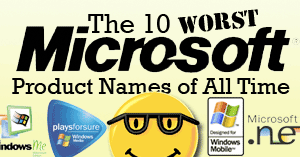 [NOTE: I wrote this piece for my pals at PC World, who kindly agreed to let me publish it here, too.]
[NOTE: I wrote this piece for my pals at PC World, who kindly agreed to let me publish it here, too.]
If Microsoft had invented the iPod, it would have been called the Microsoft I-pod Pro 2005 Human Ear Professional Edition. The cult-hit video that makes that assertion may have been a joke, but it rings true. And when word emerged that the video was a self-parody produced within Microsoft, the point was even clearer: The world’s largest software developer just isn’t very good at naming stuff.
Some Microsoft names sound clunky; some are confusing; some are undignified or overambitious. More than any other company in technology, the behemoth of Redmond loves to change product names–often replacing one lackluster label with an equally uninspired one. Microsoft has also been known to mess up some names that are actually perfectly good, such as Windows and Word, by needlessly tampering with them.
Herewith, in chronological order, are ten Microsoft names that could have been a lot better, together with some semiconstructive advice on monikers that would have more euphonious and/or more accurate. I also selected six not-quite-as-bad runners-up.
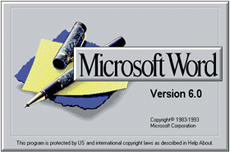 1993: Word 6.0 for Windows: When Microsoft upgraded 1991’s popular Word 2.0 for Windows, it replaced it with…no, not something logical like Word 3.0. Rather, it blithely hopscotched over three version numbers and landed at Word 6.0. The official explanation for the skippage was that it brought the Windows edition’s version number into line with that of the older DOS incarnation of Word. But conspiracy theorists noted that it also allowed Word to catch up with archrival WordPerfect, which also released a version 6.0 in 1993.
1993: Word 6.0 for Windows: When Microsoft upgraded 1991’s popular Word 2.0 for Windows, it replaced it with…no, not something logical like Word 3.0. Rather, it blithely hopscotched over three version numbers and landed at Word 6.0. The official explanation for the skippage was that it brought the Windows edition’s version number into line with that of the older DOS incarnation of Word. But conspiracy theorists noted that it also allowed Word to catch up with archrival WordPerfect, which also released a version 6.0 in 1993.
Whatever the rationale, the move rendered the practical purpose of version numbers meaningless, thereby setting a bad example for other companies such as Netscape, which later went straight from Netscape Navigator 4.0 to version 6.0.
What it should have been called: Word 3.0 for Windows. Simple and accurate.
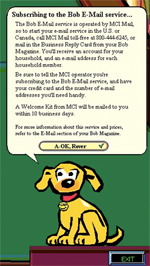 1995: Microsoft Bob. When I asked my Twitter and Facebook pals to nominate bad Microsoft names, this legendarily lousy Windows front-end hosted by animated characters came up far more often than any other product. It’s possible that the badness of the product has tarnished its title. But as several people pointed out, “Microsoft Bob” is both cutesy-cute and uninformative–it doesn’t give you an inkling as to what the product is all about. (The box featured a smiley face wearing Bill Gates-like nerdy glasses, but the main character in the interface was a dog named Rover, who was later revived for Windows XP’s misbegotten search feature.)
1995: Microsoft Bob. When I asked my Twitter and Facebook pals to nominate bad Microsoft names, this legendarily lousy Windows front-end hosted by animated characters came up far more often than any other product. It’s possible that the badness of the product has tarnished its title. But as several people pointed out, “Microsoft Bob” is both cutesy-cute and uninformative–it doesn’t give you an inkling as to what the product is all about. (The box featured a smiley face wearing Bill Gates-like nerdy glasses, but the main character in the interface was a dog named Rover, who was later revived for Windows XP’s misbegotten search feature.)
What it should have been called: Well, Microsoft Rover would have been at least slightly more descriptive–especially since the product itself was such a dog.
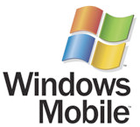 1996-present: Every name ever associated with handheld devices running Microsoft software. At first, they were called Handheld PCs, and ran an OS known as Windows CE. Then they morphed into Palm PCs–until the PalmPilot people complained, whereupon they became Palm-Size PCs. But only briefly: Soon, Microsoft wanted us to call them Pocket PCs, and the software they ran was renamed Windows Mobile.
1996-present: Every name ever associated with handheld devices running Microsoft software. At first, they were called Handheld PCs, and ran an OS known as Windows CE. Then they morphed into Palm PCs–until the PalmPilot people complained, whereupon they became Palm-Size PCs. But only briefly: Soon, Microsoft wanted us to call them Pocket PCs, and the software they ran was renamed Windows Mobile.
That name stuck around when the OS migrated from PDAs to phones, although it bifurcated into two editions: Windows Mobile Pocket PC and Windows Mobile Smartphone. Then Microsoft declared that there were three Windows Mobile variants–Windows Mobile Classic, Windows Mobile Professional, and Windows Mobile Standard. As for the devices themselves, Steve Ballmer declared in February of this year that they’d be known henceforth as Windows Phones–scratch the “Mobile.” Except for the fact that the OS is still Windows Mobile. Got that?What they should have been called: Melvin. Or just about anything else, really, as long as it didn’t keep changing.
 2000: .NET. In the mid-1990s, critics accused Microsoft was accused by many of being slow to jump on the Internet bandwagon. By the dawn of the new millennium, however, it was firmly on board–and in June 2000, it unveiled a vision for online services it called .NET. As originally articulated, .NET addressed consumers, businesses, and developers, and it involved everything from programming languages to an online version of Microsoft Office to calendaring and communications services to a small-business portal to stuff for PDAs, cell phones, and gaming consoles. It was so wildly ambitious, so all-encompassing, and so buzzword-laden that it pretty much defied comprehension, at least if you weren’t a professional geek. Which the company seemed to realize–it quickly stopped pushing the concept to consumers, instead restricting it to programming tools.
2000: .NET. In the mid-1990s, critics accused Microsoft was accused by many of being slow to jump on the Internet bandwagon. By the dawn of the new millennium, however, it was firmly on board–and in June 2000, it unveiled a vision for online services it called .NET. As originally articulated, .NET addressed consumers, businesses, and developers, and it involved everything from programming languages to an online version of Microsoft Office to calendaring and communications services to a small-business portal to stuff for PDAs, cell phones, and gaming consoles. It was so wildly ambitious, so all-encompassing, and so buzzword-laden that it pretty much defied comprehension, at least if you weren’t a professional geek. Which the company seemed to realize–it quickly stopped pushing the concept to consumers, instead restricting it to programming tools.
What it should have been called: How about “Virtually Everything Microsoft Does Involving the Internet From This Day Forward,” or VEMDIFTDF for short? Or what if Microsoft had simply declared that it was now Web-centric, period–no new branding required?
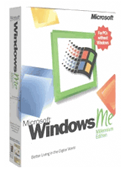 2000: Windows Millennium Edition. Microsoft couldn’t call this successor to Windows 98 “Windows 2000” because it had already assigned that name to Windows NT’s replacement. So the company saddled the OS with a name that was both pretentious and goofy, and gave it the overly adorable (and badly capitalized) nickname “Windows Me.” It was probably bad juju: The product itself went on to be widely reviled as slow, glitchy, and insubstantial; and to this day its name rivals that of Microsoft Bob as shorthand for “crummy software.”
2000: Windows Millennium Edition. Microsoft couldn’t call this successor to Windows 98 “Windows 2000” because it had already assigned that name to Windows NT’s replacement. So the company saddled the OS with a name that was both pretentious and goofy, and gave it the overly adorable (and badly capitalized) nickname “Windows Me.” It was probably bad juju: The product itself went on to be widely reviled as slow, glitchy, and insubstantial; and to this day its name rivals that of Microsoft Bob as shorthand for “crummy software.”
What it should have been called: Windows 2001, especially if Microsoft marketing had assembled an ad campaign involving HAL 9000 and/or apes hurling things at an obelisk. Bonus virtue: That name would have given Microsoft an excuse to delay the OS for six months to fix bugs.
 San Francisco’s too rainy today:
San Francisco’s too rainy today:
Apple layoffs? Supposedly not true.
Will Washington prohibit iPhone exclusivity?
Windows 7 for Netbooks: dicey?
Nvidia reaps Mac desktop windfall.
Hackers mock Apple’s Safari browser.
Obscure, good Microsoft Web services.
Sprint’s Treo Pro: March 15th.
After countless attempts at suffocating software piracy, Microsoft has accepted it as an inevitability–one that it can profit from. The company intends to deliver an ad-supported edition of Office 14 in an attempt to draw illicit users into its revenue steams, Silicon Alley Insider is reporting.
That is not to say that Microsoft has abandoned the fight–it’s just thinking outside of the box. Today, at the Morgan Stanley Technology conference, Microsoft Business Division president Stephen Elop told attendees that an ad-supported version of Office could provide Microsoft with an eventual upsell opportunity with pirate “customers.” It would also diversify its revenue streams, he said.
Over the past two years, Microsoft has pushed ahead with its Office Genuine Advantage (OGA) program. OGA requires customers to validate their licenses in order to receive updates and add-ons. The program met with resistance from some customers when their paid software was flagged.
Those measures, while helpful, have apparently fallen short. Last month, Microsoft CEO Steve Ballmer told Wall Street analysts that piracy drained Office sales more so than competition from Google Apps, OpenOffice.org, or any of its other competitors.
“We offer services through Office Live today that take advantage of both ad-funded and subscription offerings. As we announced last year at PDC, we will deliver Office Web applications, which will be available with the next version of Office, to consumers through this service. We have nothing more to share at this time,” a spokesperson said.
Microsoft has pushed the dial enough toward enforcement direction that a new direction is warranted–paying customers won’t accept more inconvenience and intrusion. I’m not certain that splattering a Web-based version of Office with ads is going to eliminate piracy altogether, but it will provide an alternative to unauthorized copying that could reduce its occurrence without markedly affecting Office license revenue.
 Steve Ballmer has finally put the kibosh on any hopes of seeing the next version of Office this year, essentially telling Wall Street analysts any rumors or leaks indicating such are not true, according to Mary Jo Foley.
Steve Ballmer has finally put the kibosh on any hopes of seeing the next version of Office this year, essentially telling Wall Street analysts any rumors or leaks indicating such are not true, according to Mary Jo Foley.
Executives have let slip apparently that there was some possiblity of a late 2009 release, and enterprise sales representatives were echoing that to their customers. However, for whatever reason it now appears that date has slipped.
Could it be a casualty of the poor economy? Possibly. Pushing it into 2010 could mean a better adoption rate as many economists expect some type of recovery to begin at that time. A lot of companies right now are slowing down their product releases as a result of the poor retail environment, which does make good business sense.
Office 14’s delay doesn’t seem to be affecting Windows 7, however. MJ’s sources still place the release of that operating system later this year. I think it isn’t a problem: an operating system release is more important that a productivity suite in my eyes.
After all, I know a few folks who have still yet to upgrade from Office XP yet.
 Did you notice Gmail’s outage?
Did you notice Gmail’s outage?
Intuit: We weren’t bullying Mint.
Vudu sells high-definition movies.
Microsoft retracts layoff-payback demand.
Most iPhone apps quickly bore.
 We still don’t know much about Microsoft Office 14 except that Microsoft has begun to give an early version to developers and that it will involve simple Web-based versions of its core apps. But Neowin has what seem to be leaked screen shots that give a sneak peek at the suite’s look and feel as it stands right now. Don’t expect to figure out much from them, though–there are some minor changes to the icons, but nothing that reveals any earthshaking changes, if such changes are indeed in there somewhere. We may need to wait until Microsoft has its say before we get much of a picture of what to expect–and when to expect it…
We still don’t know much about Microsoft Office 14 except that Microsoft has begun to give an early version to developers and that it will involve simple Web-based versions of its core apps. But Neowin has what seem to be leaked screen shots that give a sneak peek at the suite’s look and feel as it stands right now. Don’t expect to figure out much from them, though–there are some minor changes to the icons, but nothing that reveals any earthshaking changes, if such changes are indeed in there somewhere. We may need to wait until Microsoft has its say before we get much of a picture of what to expect–and when to expect it…
 Over at ZDNet, Mary Jo Foley is reporting that Microsoft has begun to hand out an alpha version of Microsoft Office 14 to a few testers. We still don’t know much about the upcoming upgrade, which should ship either late this year or sometime in 2010, other than that it will be accompanied by Microsoft’s first full-blown Web-based versions of Word, Excel, PowerPoint, and OneNote. Oh, and Mary Jo says there will be a new version of the suite: Office for Sales.
Over at ZDNet, Mary Jo Foley is reporting that Microsoft has begun to hand out an alpha version of Microsoft Office 14 to a few testers. We still don’t know much about the upcoming upgrade, which should ship either late this year or sometime in 2010, other than that it will be accompanied by Microsoft’s first full-blown Web-based versions of Word, Excel, PowerPoint, and OneNote. Oh, and Mary Jo says there will be a new version of the suite: Office for Sales.
Office 14 will be the first update to the suite since the radical interface makeover it got for Office 2007; I’ll be intrigued to see whether Microsoft leaves the new look and feel pretty much as is, or reworks it further. It’s certainly got both huge fans and recalcitrant naysayers…
